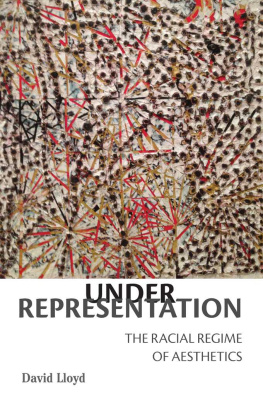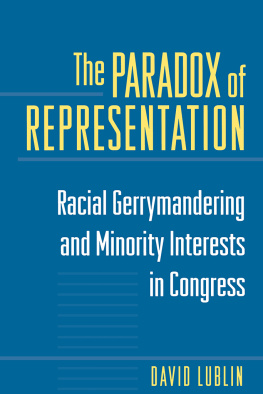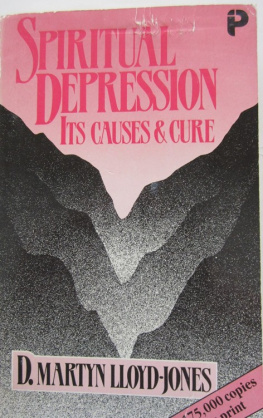David Lloyd - Under Representation
Here you can read online David Lloyd - Under Representation full text of the book (entire story) in english for free. Download pdf and epub, get meaning, cover and reviews about this ebook. year: 2018, publisher: Fordham University Press, genre: Romance novel. Description of the work, (preface) as well as reviews are available. Best literature library LitArk.com created for fans of good reading and offers a wide selection of genres:
Romance novel
Science fiction
Adventure
Detective
Science
History
Home and family
Prose
Art
Politics
Computer
Non-fiction
Religion
Business
Children
Humor
Choose a favorite category and find really read worthwhile books. Enjoy immersion in the world of imagination, feel the emotions of the characters or learn something new for yourself, make an fascinating discovery.
- Book:Under Representation
- Author:
- Publisher:Fordham University Press
- Genre:
- Year:2018
- Rating:4 / 5
- Favourites:Add to favourites
- Your mark:
- 80
- 1
- 2
- 3
- 4
- 5
Under Representation: summary, description and annotation
We offer to read an annotation, description, summary or preface (depends on what the author of the book "Under Representation" wrote himself). If you haven't found the necessary information about the book — write in the comments, we will try to find it.
Under Representation — read online for free the complete book (whole text) full work
Below is the text of the book, divided by pages. System saving the place of the last page read, allows you to conveniently read the book "Under Representation" online for free, without having to search again every time where you left off. Put a bookmark, and you can go to the page where you finished reading at any time.
Font size:
Interval:
Bookmark:
UNDER REPRESENTATION
Under Representation
THE RACIAL REGIME OF AESTHETICS
DAVID LLOYD
FORDHAM UNIVERSITY PRESS
New York 2019
Fordham University Press gratefully acknowledges financial assistance and support provided for the publication of this book by the University of California, Riverside.
Copyright 2019 Fordham University Press
All rights reserved. No part of this publication may be reproduced, stored in a retrieval system, or transmitted in any form or by any meanselectronic, mechanical, photocopy, recording, or any otherexcept for brief quotations in printed reviews, without the prior permission of the publisher.
Fordham University Press has no responsibility for the persistence or accuracy of URLs for external or third-party Internet websites referred to in this publication and does not guarantee that any content on such websites is, or will remain, accurate or appropriate.
Fordham University Press also publishes its books in a variety of electronic formats. Some content that appears in print may not be available in electronic books.
Visit us online at www.fordhampress.com.
Library of Congress Cataloging-in-Publication Data available online at https://catalog.loc.gov.
Printed in the United States of America
21 20 19 5 4 3 2 1
First edition
CONTENTS
There are books whose unfolding, from a handful of ill-formed questions to the work that finally appears, takes so many years that their chapters begin to resemble fragments of a memoir. They map out the shifting perspectives and learning processes that the passage of time hopefully entails. Under Representation is one of those books. The initial framing of its arguments stemmed from the culture wars of the late 1980s, out of a need to account for the seemingly unyielding racism of the so-called liberal institutions. How could institutions whose missions promised democratic inclusivity and enlightened inquiry remain in practice so resistant to the project of racial desegregation? To approach that question was, in the context of the intellectual lefts then-pressing concern with ideology and institutions, to inquire into the political formation of subjects that educational institutions were charged with producing. Coming to such questions from research into Irish nationalism and anticolonialism, where the role of culture in the shaping of political subjects was so prominent, I found myself pursuing them into the terrain of aesthetic philosophy, the foundation of the humanities disciplines that were most troubled by the culture wars. Those circumstantial conjunctions would become the enduring matrix of a set of questions about aesthetics, race, and politics that continued to engage me on a track that ran parallel to my ongoing work on Ireland and postcolonialism.
They were not questions that lost their urgency. In the insurgent optimism of the late 1980s, it would have been hard to envisage the retrenchment that was about to take place in the wake of the Cold War: the defunding of the university and its consequent privatization and corporatization; the rise of neoliberal economics globally, harnessed to a political foreclosure of alternatives to brutal regimes of austerity and expropriation of public goods, from welfare to education; and the rollback of the small gains of affirmative action in the name of postracial rubrics like excellence and diversity. All those factors stalled the transformative aims that had been at stake in the culture wars, above all the democratization of the university through its radical diversification. Though the institutions still spoke the language of inclusion and representation, their actual capacity to continue to segregate and to restrict access to the educational commons was borne out in the ever-more stratified demography of both the university and society. Merely to maintain and defend some of the gains of the postcivil rights decades seemed struggle enough. And the language of rights and representation that was still the idiom necessary to any defensive agenda came to seem as inadequate to the actual political situation as the invocation of universality and the human in the face of the increasing relegation of so many to disposability under the neoliberal dispensation.
The chapters gathered in Under Representation embody successive attempts to come to terms with the evolving conditions in which any struggle for democratic transformation and justice took place. Throughout, I assume that the critical theorization of the aesthetic, as the realm in which the notion of the subject of freedom was thought alongside the subordination of unfree subjects, is indispensable to understanding the formations of politics and race that shaped the modern epoch among whose ruins we continue to work. I seek to supplement the analysis of race that has been advanced so powerfully of late but that, surprisingly, has almost entirely left the terrain of aesthetic theory aside. This is especially surprising given the importance of artworks of every kind to both the imaginative survival of the racialized and the critical resistance to racism. Under Representation as a whole argues that to ignore the aesthetic as a crucial domain within which the modern idea of the human was forged is to overlook its continuing force in the formation of the racial and political structures of the present. It is that formation that I name throughout the racial regime of representation, tracking its genealogy from Enlightenment thinkers like Kant and Schiller to late modernist critics like Adorno and Benjamin.
This book emerges out of my longstanding engagement with postcolonial theory and seeks to challenge the no less peculiar occlusion of race from the major works of that field. That postcolonial engagement has been inflected by an ongoing dialogue with critical race theory and in particular with black studies, which over the last few decades have entirely transformed the thinking of race as a historical and philosophical category. My own entry point into the analysis of race and colonialism as an Irish undergraduate in England studying Irish nationalism was through Frantz Fanon. His analysis of language and colonialism in Black Skin, White Masks was to me a startling revelation of the colonial nature of British rule in Ireland, opening the way to an analytical framework that was then, in the late 1970s, virtually never considered. Fanons work has remained an indis-Preface ix pensable touchstone for me. Throughout Under Representation he opens a passageway between predominantly US analyses of race and the neglected question of raciality in postcolonial studies and between these fields and that of aesthetic theory. Hence what might otherwise seem a peculiarity of this book: its frequent juxtaposition of Fanons insights with readings of European critical thinkers. Fanons fundamental interrogation of the cultural imposition of racial colonialism that goes by the name of assimilation already implied the outlines of a critique of the racial structures of the aesthetic.
Though this is a theoretical work that intervenes primarily in the traditions of aesthetic thought, the conditions out of which I have written were always collective and dialogical. Given the many years over which it has been in the making, it would be impossible for me to acknowledge every individual from whose conversation or writing I have learned or whose criticisms I have absorbed in revising my thinking. But over those years, the common work of a number of groups and collectives has proven indispensable to my own and this book could not have been written without their sustaining commitment to dialogue as the essential medium of thought. I still think of the Group for the Critical Study of Colonialism, which met in Berkeley from about 1984 to 1991, as an inspirational example of the creative work that can be done with minimal material resources and an abundance of determination. Later, the University of California Multicampus Research Group on the Subaltern and the Popular, organized by Swati Chattopadhyay and Bhaskar Sarkar at UC Santa Barbara from 2005 to 2014, was indispensable to thinking through the question of subalternity and furnished an intellectual community that never failed to prove that laughter and enjoyment are the companions of dialectic. These were truly symposia in the original sense of the term. Most recently, the informal gatherings of the Anti-Colonial Machine have offered since 2010 the kind of insurgent spaces that generously and generatively allow one to risk venturing unfinished thought in the confidence that it will be returned augmented and enhanced. To the members of all these collectives, I am grateful for the opportunities to think together and to learn the gift of an intellectual collaboration that can never be recuperated or institutionalized.
Next pageFont size:
Interval:
Bookmark:
Similar books «Under Representation»
Look at similar books to Under Representation. We have selected literature similar in name and meaning in the hope of providing readers with more options to find new, interesting, not yet read works.
Discussion, reviews of the book Under Representation and just readers' own opinions. Leave your comments, write what you think about the work, its meaning or the main characters. Specify what exactly you liked and what you didn't like, and why you think so.












